We So Seldom Look On Love
Love Strange Love
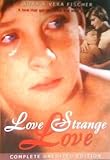
Product Description
Very rare erotic drama from Brazil starring the stunningly beautiful Xuxa Meneghel who is now one of Brazil’s most famous and much loved pop/tv stars.
This is the full 120 minute Completely Unedited Edition so it’s chock full of gratuitious nudity and the subject matter is certainly not for the easily offended.
Regarded as one of the masterpieces of the 80’s Brazilian erotic cinema boom, it’s the story of a young boy’s discovery of sexual pleasure.
The story takes place in the memory of Hugo, now a middle-aged man as he remembers back to when as a young boy he was sent away to stay with his mother Anna, who lives in a luxurious brothel.
At first intimidated by all the girls he soon becomes curious and slowly they help him adjust to the strange atmosphere whilst all the while becoming closer and closer to his mother.
The Pillow Book
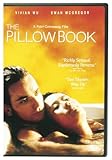
Amazon.co.uk Review
Peter Greenaway (The Cook, the Thief, His Wife and Her Lover, Drowning by Numbers) continues to delight and disturb us with his talent for combining storytelling with optic artistry. The Pillow Book is divided into 10 chapters (consistent with Greenaway’s love of numbers and lists) and is shot to be viewed like a book, complete with tantalising illustrations and footnotes (subtitles) and using television’s “screen-in-screen” technology. As a child in Japan, Nagiko’s father celebrates her birthday retelling the Japanese creation myth and writing on her flesh in beautiful calligraphy, while her aunt reads a list of “beautiful things” from a 10th-century pillow book. As she gets older, Nagiko (Vivian Wu) looks for a lover with calligraphy skills to continue the annual ritual. She is initially thrilled when she encounters Jerome (Ewan McGregor), a bisexual translator who can speak and write several languages, but soon realises that although he is a magnificent lover, his penmanship is less than acceptable. When Nagiko dismisses the enamoured Jerome, he suggests she use his flesh as the pages which to present her own pillow book. The film, complete with a musical score as international as the languages used in the narration, is visually hypnotic and truly an immense “work of art”. –Michele Goodson
Mulholland Drive
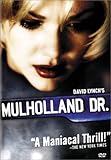
Amazon.co.uk Review
Pandora couldn’t resist opening the forbidden box containing all the delusions of mankind, and let’s just say in Mulholland Drive David Lynch indulges a similar impulse. Employing a familiar film noir atmosphere to unravel, as he coyly puts it, “a love story in the city of dreams”, Lynch establishes a foreboding but playful narrative in the film’s first half before subsuming all of Los Angeles and its corrupt ambitions into his voyeuristic universe of desire. Identities exchange, amnesia proliferates and nightmare visions are induced, but not before we’ve become enthralled by the film’s two main characters: the dazed and sullen femme fatale, Rita (Laura Elena Harring), and the pert blonde just-arrived from Ontario (played exquisitely by Naomi Watts) who decides to help Rita regain her memory. Triggered by a rapturous Spanish-language version of Roy Orbison’s “Crying”, Lynch’s best film since Blue Velvet splits glowingly into two equally compelling parts. –Fionn Meade
Audition
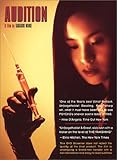
Amazon.co.uk Review
Much of the controversy surrounding Takashi Miike’s Audition centres on the disturbing nature of the later part of the film–understandable when you consider the imprint these admittedly horrific images leave on the viewer–but fails to note the intricate social satire of the rest. This is a film that offers insight into the changing culture of Japan and the generation gap between young and old. Shigeharu Aoyama is looking for an obedient and virtuous woman to love and asks, “Where are all the good girls?”–a comment that seals his fate. A fake audition is organised to find Aoyama a wife. Asami Yamazaki is introduced as the virtuous woman he is looking for, dressing for the majority of the film in white and behaving with the courtesy of an angel, especially when juxtaposed against the brash stupidity of the other girls at the audition. Although his friend takes an immediate “chemical” dislike to her, Aoyama begins a love affair to end all love affairs. But as Asami’s history unfolds we see her pain and torture and slowly understand that the tortured in this instance holds the power to become the torturer. Aoyama is slowly drawn away from his white, metallic and homely environment into the vivid- red and dirty-dark environment of Asami’s sadistic world.
Audition can be viewed on a number of levels, with important feminist, social and human rights issues to be drawn from the story. However, the real power of this film is its descent into the subconscious, to a point where reality is blurred and the audience is unable to decide whether the disturbing images on screen are real or surreal. This refined, hard-hitting and essentially Japanese style of horror is ultimately much more powerful than anything offered by Hollywood. This is a film that will get under your skin and infect your consciousness with a blend of fearless gore and unimaginable torture. It is not for the faint-hearted. –Nikki Disney
Mulholland Dr.
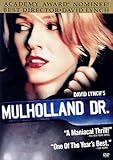
Amazon.co.uk Review
Pandora couldn’t resist opening the forbidden box containing all the delusions of mankind, and let’s just say in Mulholland Drive David Lynch indulges a similar impulse. Employing a familiar film noir atmosphere to unravel, as he coyly puts it, “a love story in the city of dreams”, Lynch establishes a foreboding but playful narrative in the film’s first half before subsuming all of Los Angeles and its corrupt ambitions into his voyeuristic universe of desire. Identities exchange, amnesia proliferates and nightmare visions are induced, but not before we’ve become enthralled by the film’s two main characters: the dazed and sullen femme fatale, Rita (Laura Elena Harring), and the pert blonde just-arrived from Ontario (played exquisitely by Naomi Watts) who decides to help Rita regain her memory. Triggered by a rapturous Spanish-language version of Roy Orbison’s “Crying”, Lynch’s best film since Blue Velvet splits glowingly into two equally compelling parts. –Fionn Meade
Dr. Strangelove or: How I Learned To Stop Worrying and Love the Bomb

Amazon.co.uk Review
Arguably the greatest black comedy ever made, Stanley Kubrick’s cold war classic is the ultimate satire of the nuclear age. Dr. Strangelove is a perfect spoof of political and military insanity, beginning when General Jack D. Ripper (Sterling Hayden), a maniacal warrior obsessed with “the purity of precious bodily fluids,” mounts his singular campaign against Communism by ordering a squadron of B-52 bombers to attack the Soviet Union. The Soviets counter the threat with a so-called “Doomsday Device,” and the world hangs in the balance while the US president (Peter Sellers) engages in hilarious hot-line negotiations with his Soviet counterpart. Sellers also plays a British military attaché and the mad bomb-maker Dr. Strangelove; George C. Scott is outrageously frantic as General Buck Turgidson, whose presidential advice consists mainly of panic and statistics about “acceptable losses.” With dialogue (“You can’t fight here! This is the war room!”) and images (Slim Pickens’ character riding the bomb to oblivion) that have become a part of our cultural vocabulary, Kubrick’s film regularly appears on critics’ lists of the all-time best. –Jeff Shannon, Amazon.com –This text refers to another version of this video.
Dr. Strangelove or: How I Learned To Stop Worrying and Love the Bomb
Beyond the Valley of the Dolls
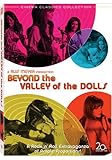
Amazon.co.uk Review
You either love Russ Meyer’s garishly sexist movies about bodacious babes and horny men or you find them utterly disgusting. The response to his work is that clear-cut. Beyond the Valley of the Dolls, which features a screenplay by critic Roger Ebert, barely qualifies as a sequel to the film based on Jacqueline Susann’s trashy bestseller. Rather, it’s a broad, trashy remake on its own terms about what happens to a trio of female rock musicians when they leave the Midwest and head for Hollywood. Sex, drugs, murder–the only thing it doesn’t have is cannibalism, the gold standard when it comes to trashy entertainment. –Marshall FineEND

